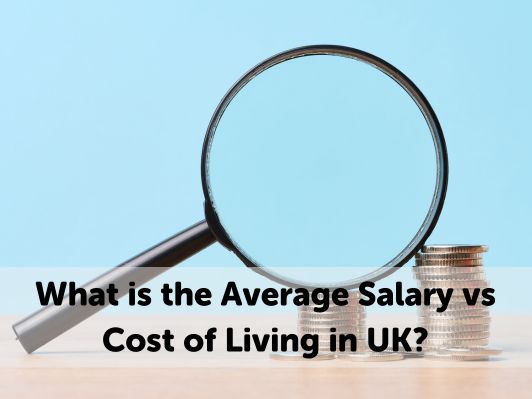With the rising cost of living in the UK, there’s growing concern about affordability in 2024 and beyond. The average salary increased by approximately 7.6% for private section. 5.6% for public section in February to April 2023. It might not suffice to meet the escalating expenses of housing, food, and essentials.
In this article, we’ll tell you about the average salary vs cost of living in the UK is. Examine the relationship between average salaries. Average house prices. And the rising cost of living in the UK. Also, delving into potential solutions for individuals facing financial challenges.
Table of Contents
What is the average salary in the UK?

In the UK, the median average salary is estimated to be £31,772. This average wage varies depending on factors such as region, industry and job position. That said, it’s important to note that these figures can change over time. This is due to economic conditions, wage growth and other factors.
Looking for ways to save money from salary? Here is our detailed guide on how to save money from salary. Do give it a read.
What is the average cost of living in the UK?
The average cost of living for a family of four in the UK, including rent, is around £4,000 to £4,500. Living away from major cities might change this figure. Managing finances well is essential. But major expenses and household expenditure like rent, food, transport, and taxes are typically covered within this range.
For a family of two in the UK, the average cost of living is about £2,500 to £3,000. This includes rent and essential costs. Sharing living costs can be beneficial. It allows splitting the rent and other basic costs and utility bills.
For a single person, the average monthly living cost in the UK is estimated to be around £651. That too without rent included.
As a student in the UK, the average cost of living is approximately £1,000 to £1,600, including rent. This average rent amount can vary depending on your location. And whether you choose to live alone in a flat or share accommodation with a roommate.
How is the cost of living measured in the UK?

Simply put, the cost of living in the UK as a big calculation. It measures how much money an average person needs to cover their basic expenses. It includes things like rent, groceries, transportation, and other necessities.
Economists use special data and formulas to track the average prices of these items over time. When the cost of living goes up, it means these expenses are increasing. And people might need to spend more to maintain their standard of living. It’s an important measure to understand how the economy is doing and how it affects people’s wallets.
Here is our detailed guide on how much do you need to live comfortably in the UK. Do give it a read.
Regional variations in average salary vs cost of living
London
London, the capital city of the UK, is renowned for its bustling economy and vibrant lifestyle. It’s also the most expensive city centre in the UK. According to data from the UK House Price Index, as of August 2022, the average house price in London is still rising at a rate of 9.5% annually.
Living in London and looking to save money? Here is our detailed guide on best ways to save money in London. Do read it.
South East
This region of the UK is characterised by its affluence and proximity to London. While it may not be as expensive as the capital, the cost of living in this region remains relatively high.
The region is known for its thriving economy. And opportunities to earn more money. It translates into higher salaries here.
South West
The South West has a lower cost of average living cost. And lower housing costs. This allows individuals to manage living costs and have a higher disposable income.
Midlands
The Midlands region in the northeast of the UK encompasses cities such as Birmingham, Nottingham, and Leicester. It is the cheapest region known for its affordability. And lower average property prices in comparison to the South and London.
The housing market in the Midlands generally offers more affordable options. This makes it an attractive destination for those seeking a lower average living cost.
North East
The North of England comprises cities such as Manchester, Leeds, Newcastle, and Liverpool. This region is known for its lower cost of living compared to the South. This makes it an appealing choice for individuals seeking affordable housing. Lower monthly rent. Council tax. And lower everyday living expenses elsewhere.
According to national statistics made to Zoopla, the average price of a standard house price in Manchester over the past 12 months is £250,419. (Information true as of 28th July 2023)
Scotland, Wales, and Northern Ireland
Beyond England, Scotland, Wales, and North Ireland each have their own distinctive cost of living council tax considerations. Scotland offers a diverse range of urban and rural settings. Also cities like Edinburgh and Glasgow have higher costs compared to smaller towns and rural areas.
How to budget your monthly salary vs cost of living?
To ensure your monthly salary covers your cost of living, creating a budget is essential. A budget helps you track income, expenses, and disposable cash, preventing overspending beyond your means.
One straightforward budgeting approach is the 50/30/20 rule. Allocate 50% of your income to essential costs like rent and food. 30% to non-essential expenses like entertainment. And travel, and 20% to savings or debt repayment.
Remember, there’s no one-size-fits-all method for budgeting. Find a system that suits you best and stick to it to achieve financial stability.
Strategies for combatting the cost of living
Struggling to meet even your general living expenses? Here are a few possible solutions that you can consider:
Increase your income
Look for opportunities to boost your income, such as:
- Finding a part-time job
- Freelancing
- Side hustles
- Online selling
- Investments
Spend time looking for part-time or seasonal opportunities that fit your schedule. And skill set, you can supplement your main income.
Consolidate debt
If burdened with debt, develop a plan to pay it off systematically. Consider debt consolidation or negotiation with creditors for better terms.
Reduce non-essential expenses
Reducing non-essential expenses is a practical approach to improve financial stability. And also save money. Here are some specific strategies to achieve this:
Entertainment: Limit spending on entertainment activities. This includes eating out, going to the movies, or attending concerts. Instead, explore free or low-cost alternatives like picnics, outdoor activities, or streaming services.
Subscription services: Evaluate and cancel subscription services you don’t use frequently. Or consider sharing accounts with family or friends to split costs.
Clothing: Buy clothing during sales or clearance periods and avoid impulsive purchases. Consider shopping at thrift stores or second-hand shops for affordable options.
Beauty and grooming: Consider do-it-yourself beauty treatments or grooming to reduce salon or spa expenses.
Gifts: Be thoughtful with gift-giving and consider homemade or heartfelt presents rather than expensive items.
Manage food expenses
Managing food expenses is crucial when considering the cost of living. Here are some strategies to effectively budget and save money on food costs:
- Plan your meals in advance
- When you do your food shopping, buy non-perishable items in bulk
- Cook at home
- Use coupons and discounts to help with rising food prices
- Shop seasonal produce
Look for ways to reduce council tax
Explore options to qualify for Council Tax Reduction if you have a low income. This can significantly decrease the amount of Council Tax you are required to pay. Check your eligibility for Council Tax Reduction on the official UK government website.
Ask for help
Don’t hesitate to seek financial assistance from family. Friends. Or charitable organizations if you’re facing financial constraints. You can ask for a loan or financial support that you can repay over a few months. You can repay from your salary (excluding your monthly rent due). It’s okay to reach out for help when needed to overcome temporary financial challenges.
FAQs
What is an average liveable salary in the UK?
The average liveable salary in the UK varies depending on personal circumstances. And also on your location. However, to achieve a comfortable lifestyle with financial freedom and some luxuries, an estimated income of £33,600 per year is suggested for individuals.
Is 40k a good salary UK to live comfortably?
In many parts of the UK, a salary of £40,000 can provide a comfortable living for individuals. And even small families. However, in expensive cities like London, living costs can be higher. And £40,000 might be more challenging to stretch for a luxurious lifestyle.
Disclaimer: The information given above is provided for information purpose only. This is not financial advice. Also, the external parties linked are provided for reference only.
Related guides:
How Much Emergency Fund Should I Have in Savings in UK

